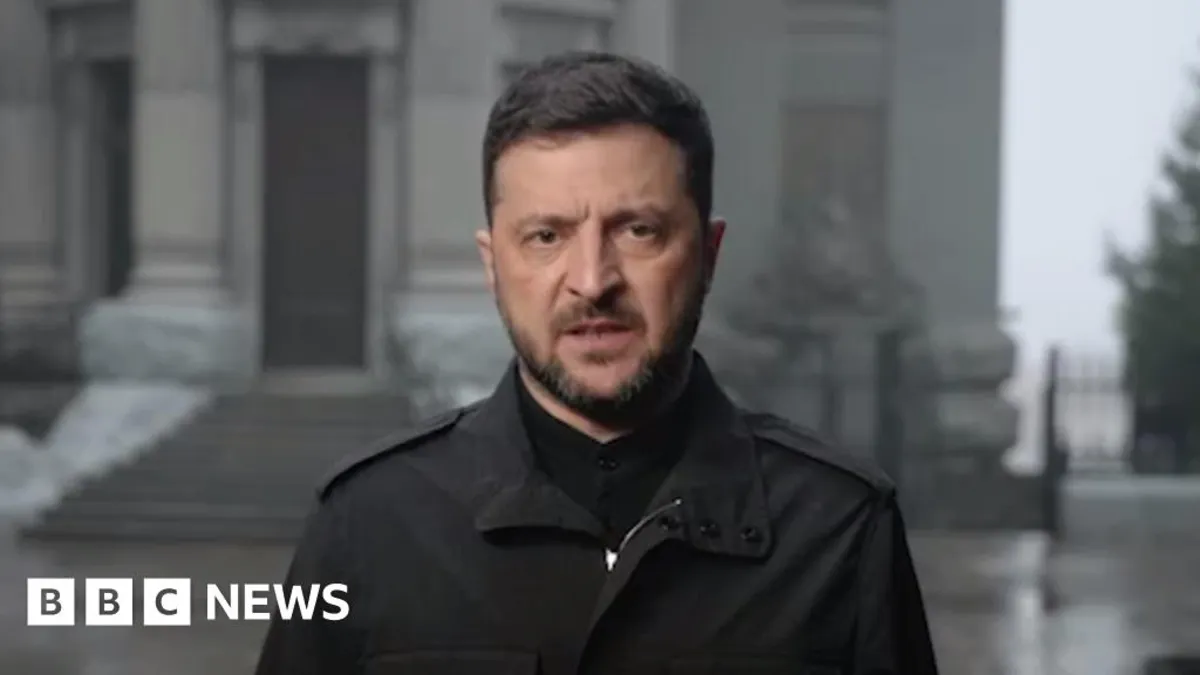
Ukrainian President Volodymyr Zelensky has issued a stark warning that Kyiv risks jeopardizing its vital support from the United States due to a controversial White House plan aimed at resolving the ongoing war with Russia. In a heartfelt address to the nation on Friday, Zelensky articulated the difficult choices Ukraine may be forced to confront: the potential loss of dignity or the risk of alienating a crucial ally. He emphasized that this moment in history represents one of Ukraine's most challenging periods.
The US peace plan, which has been widely leaked, includes several proposals that Ukraine had previously dismissed. These controversial provisions entail ceding control of eastern territories currently held by Ukraine, significantly reducing the size of its military, and making a pledge not to pursue membership in NATO. Such terms are perceived as heavily favoring Russia, with President Vladimir Putin suggesting that the plan could serve as a foundation for a peace settlement. During a meeting with his security cabinet, Putin confirmed that Moscow had received the plan, although it had not been thoroughly discussed with the Kremlin. He reiterated Russia's willingness to demonstrate flexibility while also remaining prepared to continue the fight.
Later the same day, US President Donald Trump stated that Zelensky must endorse the peace plan; otherwise, the conflict between Ukraine and Russia would persist. Ukraine's dependence on US military support is critical, with advanced weaponry and air defense systems being essential to counter Russian air assaults. The full-scale invasion of Ukraine by Russia began in 2022, and the ongoing conflict has placed immense pressure on the Ukrainian government.
In his ten-minute address from the presidential office in Kyiv, Zelensky warned that Ukraine would face increasing pressure aimed at weakening and dividing the nation. He urged Ukrainians to remain united and emphasized the importance of considering the country's national interests in the face of adversity. "We are not making loud statements," he stated, "but we will be working calmly with America and all our partners, offering alternatives to the proposed peace plan."
Zelensky reported that he received reassurances of ongoing support during a phone call with UK Prime Minister Sir Keir Starmer, French President Emmanuel Macron, and German Chancellor Friedrich Merz. Starmer emphasized that Ukraine's allies are dedicated to achieving a just and lasting peace. Ahead of the upcoming G20 summit in South Africa, he mentioned that world leaders would discuss the current proposals and seek ways to strengthen the peace plan.
In Washington, Trump cautioned that Ukraine could lose additional territory to Russia in the near future. He proposed that Ukraine be given until November 27—Thanksgiving in the US—to agree to the peace deal, although he noted that deadlines could be adjusted if progress was seen. Speaking at the White House, Trump expressed confidence in a pathway to peace, insisting that Zelensky would need to approve it.
As US officials continue to push Kyiv to accept the peace plan rapidly, top Pentagon officials recently visited the Ukrainian capital. Meanwhile, Putin has shown determination to persist with the war despite significant Russian combat casualties. He outlined that the primary objective remains the unconditional achievement of the goals of their "special military operation."
The 28-point US peace plan emerged as Russia claimed minor territorial gains in southeastern Ukraine, while Zelensky grapples with a domestic crisis involving senior officials linked to a $100 million corruption scandal. The White House has countered assertions that Ukraine was excluded from the drafting process, clarifying that discussions occurred with Ukraine's top security official, Rustem Umerov, who reportedly agreed to most of the plan's provisions.
The leaked draft outlines proposals for the withdrawal of Ukrainian troops from parts of the eastern Donetsk region and the de facto recognition of Russian control over Donetsk, Luhansk, and Crimea, which Russia annexed in 2014. The plan also suggests freezing the borders of Ukraine's southern Kherson and Zaporizhzhia regions along current battle lines, both of which are partially occupied by Russia.
Furthermore, the US plan stipulates that Ukraine's military size would be capped at 600,000 personnel, with European fighter jets stationed in neighboring Poland. Despite assurances of receiving reliable security guarantees, the specifics remain vague. The document also anticipates that Russia will refrain from invading neighboring countries and that NATO expansion will cease. Additionally, it envisions Russia's reintegration into the global economy through lifted sanctions and a potential return to the G7, restoring it to the G8 status.
Reactions from Ukrainians, both in occupied and liberated territories, have been defiant. In Kyiv, the widow of a Ukrainian soldier expressed her discontent, declaring, "This is not a peace plan; it is a plan to continue the war." Another resident from occupied regions voiced concerns over the narrative that Ukraine has forgotten its people, hoping the proposed agreement will not be signed. Currently, Russia controls approximately 20% of Ukrainian territory, making slow advances despite significant losses along the extensive front line.